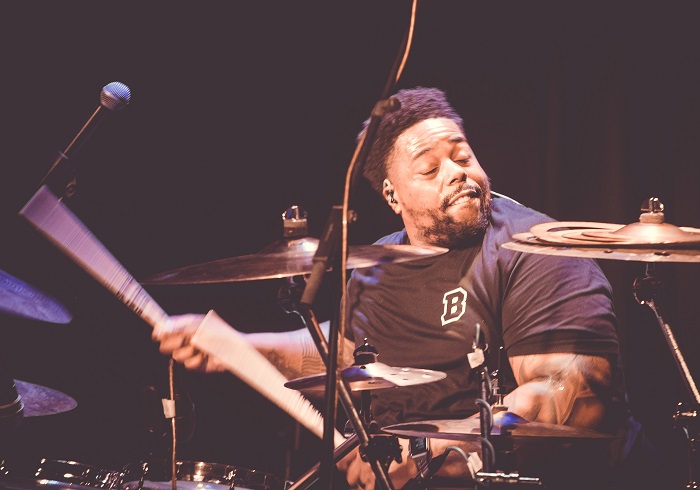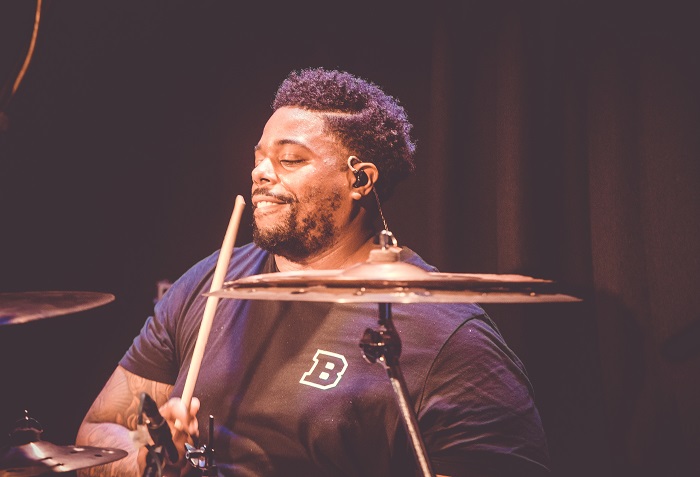Aaron Spears on Why Drummers Need to Stop Fussing Over Speed and Chops
“Focus on the groove first,” says the American musician who has worked with the likes of James Brown and Chaka Khan
Catching up with Aaron Spears was as delightful as it could get. As much as the American drummer loves tearing it up on stage with his formidable skills — whether it’s with Usher and James Brown at the 47th Annual Grammy Awards ”“ in real life, he’s soft-spoken, down-to-earth and exudes a sort of positivity that rubs off on you instantly.
Last month, Spears was in India for the first time to conduct two drum clinics as part of Zildjian’s India Clinic Tour, one each in Mumbai and New Delhi. He said, “Drums is supposed to be a thing of fun, you’re supposed to enjoy it and we have to get back to having a good time and not putting too much pressure on ourselves.”
Read excerpts from our interview with the Washington-bred artist:
What do you remember about meeting James Brown and performing with him alongside Usher at the Grammys in 2005?
That was so crazy to me because as I got older I began to listen to other things and Motown was one of those things; bands like Earth, Wind & Fire, Chicago and James Brown was also one of those guys. I remember being in rehearsal in L.A., we were working on our arrangement of (Usher’s) “Caught Up” going into (Brown’s) “Sex Machine” and there were these huge doors to the rehearsal hall, 30-foot doors like super duper tall because the rehearsal space was like a sound stage and I remember seeing the doors kind of like slowly open up, and because the light was shining through you couldn’t really see who was on the other side of the door. But as they started getting closer to the room you started to see like the silhouette of the person and when he walked into the room we finally realized “Oh God, that’s really James Brown” and he’s walking in. He had his glasses on, he had his brown suit with a short kind of jacket which was his style so that gave him plenty of room to move and he came walking in and he took his glasses off and then everything stopped, we stopped playing, just out of respect to say hello to him and he said, “Alright brothers, I wanna hear the song.”
He went to every single musician that was there first to say hello and then to give them his critique on what they were playing. He went to the keyboard player and was like “The chords you playin’ right there when we go to the B-section, that’s not the right chord let’s try something different.” He went to the guitar player and said, “What you playin’ there, the one should be a bit harder or maybe upstroke on the one. Bass player let me hear what you’re playin’.” You know everybody that he went to he had some sort of adjustment that he made and then he looks over at me and is starting to walk in my direction and I started to get so nervous and I was like this is James Brown what is he going to say, he came over to me and he said, “Drummer! You alright,” and that made me feel like I can conquer the world and I was just very appreciative of him to take the time to talk to us and hang out with us which was really cool and the performance went well it was a successful performance and everyone was really happy.
You’ve played with everybody from the Backstreet Boys and Britney Spears to Lil Wayne and Carrie Underwood — how do you adapt playing with so many different artists and sometimes genres that are poles apart?
For me, honestly, it’s not anything I set out to say, “I want to play with everyone.” I just try to stay positive with my interaction with people and I try to continue to improve and evolve my skills. I’ve just been really fortunate and really blessed that people have seen that and liked that and asked me to be a part of what they’re doing. It’s been fantastic.
Any particular moment in the studio that’s been very special?
I was with Chaka Khan working on her record Funk This –Â I remember after recording like maybe two or three tunes she was like, “Man, we need to be on tour.” And I said I’d love to tour with you but I don’t know if that’s possible time wise and she replied, “You’ll always bringing the good stuff and don’t let me hold on to it.” It was just really cool to see that she respected what it is that I do. To me that felt really good.
Gospel music has played a big part in your upbringing as an artist. Can you tell me how those early years shaped you into the musician you are today?
For me, my beginnings started in church as a kid, my parents would take me with them to church. Church was really, really important to my family. Religion and a relationship with God was really important, so every Sunday we’d be at church and it was there that I first saw instruments like in a live setting and the drums is really what grabbed my attention the most. At a super young age I was trying to mimic the things that I saw. I would be at church with a pair of sticks just air drumming and kind of like going wild and going crazy. But it was those moments that really inspired me and that’s pretty much how things began.
You count the likes of Dave Weckl, Dennis Chambers and even Travis Barker as influences. In what ways have these musicians inspired you?Â
Whether it’s the things that they play or whether it’s the life that they live, like the positivity that they exude even in adversity. Even with Travis, I love what he does with Blink-182, it’s incredible. The legacy that he’s created is insane but Travis is such a good dude, he’s such a good person and for him to have gone through the things that he’s gone through (Barker was involved in a plane crash in the U.S. in 2008), for him to still remain positive and to still remain wanting to do great things musically and also just in this world is so inspiring. For me the inspiration comes in many different forms and many different ways.

“For me inspiration comes in many different forms and many different ways,” says Spears.
Tell me more about your signature sticks that you collaborated with Vic Firth for and even the cymbal pack you did with Zildjian.
Basically, the stick is like a combination of a 3A (size), it has like the balance of the 3A, I want to say it’s got a little bit of weight so you’re not working as hard to play, it’s got the length of like a 5A extreme so it’s a little bit longer so you don’t have to reach as far. For me it works, it’s a preference thing. I feel like the balance, the weight and the length of the stick make it super comfortable for the player to be able to get around a kit the way that I do and the sticks project really well, a really great sound.
The cymbal pack is the K-Series with Zildjian which I’m really thankful that they trusted me enough to put me on a box. I’ve been talking to Zildjian too on working on creating a couple cymbals as well, so hopefully in the future we’ll have something to show for that.
What topics do you usually like to cover at your drum clinics?
The importance of having balance! I think it’s extremely important for a drummer to be able to not just be able to play in one way or one style. Everyone now is so extremely fascinated with just chops, all these incredible figures, different speeds around a kit which I think is fantastic but it’s also important to be able to play a groove, it’s also important to be able to play the part and I feel the two go hand in hand. You can’t really have one without the other.
Also”¦ having fun and not putting too much pressure on yourself to live up to what you see on Instagram or what you see on YouTube. I mean I think that the stuff that we’re allowed to watch or take in is fantastic but what we don’t see is the mistakes, the takes that people don’t post. It’s like you see this perfected masterpiece that fits in this one minute space and because of that everyone is like “I must play like this.”
What advice do you have for people who haven’t yet started but want to get into playing drums?
I would say it starts with having a love and passion for music. I think that’s really important and you got to start somewhere. So if it’s you jamming at home or your couch with your pillows and some music on your headphones and you’re just hitting the mess out of your couch–cool! That’s fine, that’s where it starts. Hopefully you’ll love it and the desire you have to be a musician will form and maybe you go from that to getting a drum set or a pad.
Do you ever get away from music?
Definitely, for me I just like to do normal regular stuff, sightseeing if I can, spending time with my family, the movies, even grocery shopping, its fun sometimes walking around a grocery store pushing a cart. Music is important to me but balance is also important so I kind of feel you have to have that and for me to step away from music to do normal things, makes me appreciate it even more when I get back to it.
All photos by Kheyali Ashar.Â




